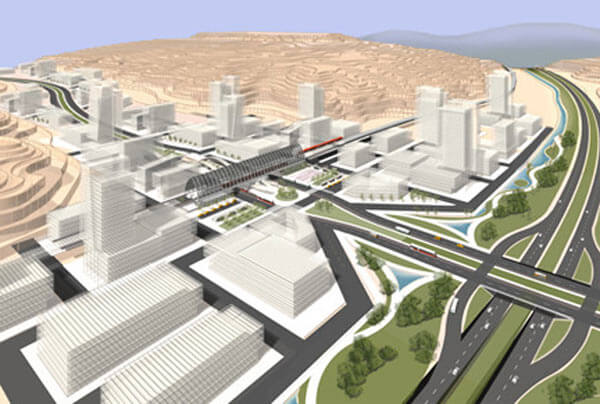By Alan Krawitz
Can Israeli and Palestinian states truly exist side-by-side in relative peace and prosperity?
That was the formidable question posed late last month at Queens College’s Center for Ethnic, Racial and Religious Understanding as it hosted a presentation and panel discussion on the Arc Project, a visionary plan that serves as a practical blueprint for the Israeli and Palestinian states to co-exist peacefully.
The Arc Project was developed more than six years ago by the Rand Corp., a nonprofit, global think-tank, and California-based architects Suisman Urban Design. At the core of the Arc is a national transportation infrastructure plan that links, by rail and bus, the major cities in the West Bank and Gaza Strip.
Despite receiving significant praise from the press as well as architectural and urban planning experts, the project remains a vision that has yet to be realized.
“Everyone likes the vision of the Arc … but there is no government advocate for this project,” said Chris Tucker, manager of Yale House Ventures, a portfolio of social ventures and technology companies that includes the nonprofit Friends of the Arc, a nonprofit group established by individuals interested in achieving Israeli-Palestinian co-existence.
Tucker spoke about using the vision of the Arc to bring different parties to the table, but he conceded there are still significant bridges and barriers to overcome, with one of the biggest being the estimated price tag for the project.
The Rand Corp. estimates construction of the Arc to be $9 billion.
“That cost just won’t fly in Congress,” he said at the Feb. 28 even.
David Makovsky, a former journalist in Israel and now director of the Project on the Middle East Peace Process at The Washington Institute, agreed that the vision behind the plan is crucial to its success.
“No one was focusing on the urban design [of a Palestinian state]. It went from an afterthought to the compelling glue as to how to get to a place of prosperity in Palestine,” he said.
Makovsky, however, is a firm believer that the issue of security lies at the heart of both sides’ misgivings about the Arc or of real peace in the region. “At issue is the understanding of events from the last decade,” he said. “From 2000 forward, there has been a real security trauma and we need to guarantee security for both sides.”
He added that there must be a meeting of the minds between both sides’ security establishments.
“There are too many ticking clocks here … too much time elapsing will only lead to an increase in the forces of radicalization.”
“The good news,” said Ghaith al-Olmari, executive director at the American Task Force on Palestine and a former negotiator for the Palestinian Authority, “is that all the major players here believe there needs to be a solution.”
Al-Olmari said that in negotiations you need “an agreement that sells.”
But he pointed out that behind the scenes there has been greater cooperation between Israeli and Palestinian security establishments.
Makovsky agreed, saying strong cooperation has existed among the security forces of both sides since 2007 but has not been widely reported by the media.
“This could be the year that we start to see a shift towards a lasting solution,” al-Olmari said optimistically.
Speaking about the complexities of financing a $9 billion project, Tucker suggested the development of an “Arc Bank,” or a development authority, similar in structure to New York City’s Triborough Bridge & Tunnel Authority.
“We have to think in terms of a large-scale, strategic investment, particularly one that will yield good returns,” Tucker said.
Al-Olmari suggested going more the route of a private-public partnership.
Regardless of the financing, Makovsky related the sage words of a Palestinian official he met with in Ramallah.
“He told me that one of the most important aspects to any peace would be the jobs it produces,” he said.
The Rand Corp. estimates that more than 160,000 construction jobs would be created in Palestine once building of the Arc commenced.
Al-Olmari said a two-state solution is the only viable path for the area.
“Both sides need to cross historic thresholds at the same time,” explained Makovsky. “The Israelis are still skeptical of returning to pre-1967 borders because they’ve been rocketed from areas they’ve vacated. There must be a convergence of interests because neither side wants the radicals to win. Otherwise there will be no peace.”
Tucker concluded that security alone will not bring about peace in the Middle East.
“Security doesn’t buy you security, prosperity buys you security. There has to be the vision of prosperity, too,” he said.
For more information on the Arc project, visit friendsofthearc.org or rand.org/Palestine.




































